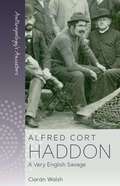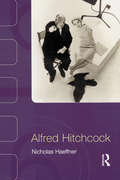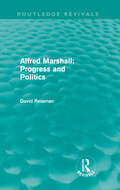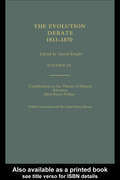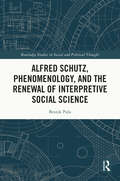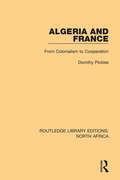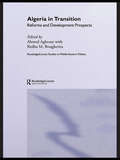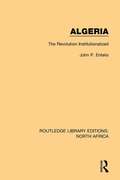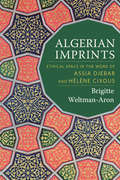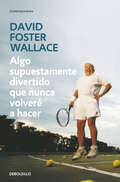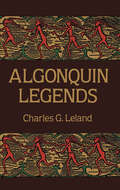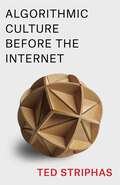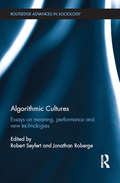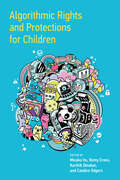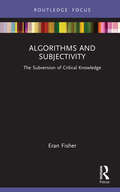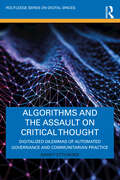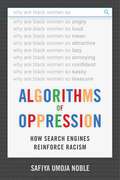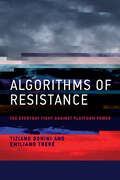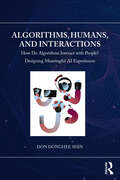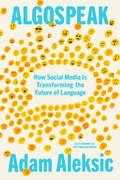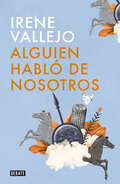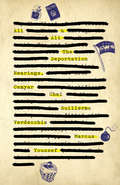- Table View
- List View
Alfred Bester’s The Stars My Destination: A Critical Companion (Palgrave Science Fiction and Fantasy: A New Canon)
by D. Harlan WilsonIn this comprehensive study of The Stars My Destination, D. Harlan Wilson makes a case for the continued significance of Alfred Bester’s SF masterwork, exploring its distinctive style, influences, intertextuality, affect, and innovation as well as its extensive metafictional properties. In Stars, Bester established himself as a son of the pulp-SF and high-modernist writers that preceded him and a forefather to the New Wave and cyberpunk movements that followed his lead. Wilson’s study depicts Bester as an SF insider as much as an outlier, writing in the spirit of the genre but breaking with the fixation on hard science in favor of psychological interiority, literary experimentation, and adult themes. The book combines close-readings of the novel with broader concerns about contemporary media, technoculture, and the current state of SF itself. In Wilson’s view, SF is a moribund artform, and Stars foresaw the inevitable science fictionalization of our benighted world. With scholarly lucidity and precision, Wilson shows us that Stars pointed the way to what we have (un)become.
Alfred Cort Haddon: A Very English Savage (Anthropology's Ancestors #5)
by Ciarán WalshAn innovative account of one of the least-understood characters in the history of anthropology. Using previously overlooked, primary sources Ciarán Walsh argues that Haddon, the grandson of anti-slavery activists, set out to revolutionize anthropology in the 1890s in association with a network of anarcho-utopian activists and philosophers. He regards most of what has been written about Haddon in the past as a form of disciplinary folklore shaped by a theory of scientific revolutions. The main action takes place in Ireland, where Haddon adopted the persona of a very English savage in a new form of performed photo-ethnography that constituted a singularly modernist achievement in anthropology. From the Introduction: Alfred Cort Haddon was written out of the story of anthropology for the same reasons that make him interesting today. He was passionately committed to the protection of simpler societies and their civilisations from colonists and their supporters in parliament and the armed forces.
Alfred Hitchcock
by Nicholas HaeffnerNicholas Haeffner provides a comprehensive introduction to Alfred Hitchcock's major British and Hollywood films and usefully navigates the reader through a wealth of critical commentaries. One of the acknowledged giants of film, Hitchcock's prolific half-century career spanned the silent and sound eras and resulted in 53 films of which Rear Window (1954), Vertigo (1958) and Psycho (1960) are now seen as classics within the suspense, melodrama and horror genres. In contrast to previous works, which have attempted to get inside Hitchcock's mind and psychoanalyse his films, this book takes a more materialist stance. As Haeffner makes clear, Hitchcock was simultaneously a professional film maker working as part of a team in the film factories of Hollywood, a media celebrity, and an aspiring artist gifted with considerable entrepreneurial flair for marketing himself and his films. The book makes a case for locating the director's remarkable body of work within traditions of highbrow, middlebrow and lowbrow culture, appealing to different audience constituencies in a calculated strategy. The book upholds the case for taking Hitchcock's work seriously and challenges his popular reputation as a misogynist through detailed analyses of his most controversial films.
Alfred Marshall's Mission (Routledge Revivals)
by David ReismanAlfred Marshall was anxious to do good. Intended by an Evangelical father for the vocation of clergyman, the author of the mould-shaping Principles of Economics remained to the end of his days a great preacher deeply committed to raising the tone of life. First published in 1990, Alfred Marshall’s Mission explains how this most moral of political economists sought to blend the downward sloping utility function of Jevons and Menger with the organic evolutionism of Darwin and Spencer, how this celebrated theorist of social alongside economic growth sought to combine the mathematical marginalism of Cournot. Thunen and Edgeworth with the ethical uplift of Green, Jowett and Toynbee. The conclusion reached is that perhaps Marshall was, after all, too anxious to do good. Far more economists, however, have been not anxious enough; and that in itself gives this study of Marshall’s life and times a present day relevance which would, no doubt, have appealed strongly to the shy Cambridge professor who is its subject.
Alfred Marshall: Progress And Politics (Routledge Revivals)
by David ReismanFirst published in 1987, Alfred Marshall: Progress and Politics provides an enlightening insight into Marshall's thoughts on social improvement, adaptive upgrading, policy and polity. He planned books on these subjects which he never subsequently wrote, but the thesis of this work is that a close study of such writings as Marshall did complete makes possible a very detailed reconstruction of the important contribution which Marshall was capable of making to Victorian evolutionary thought (much in the shadow of Darwin and Spencer). In the ongoing debate on the political element in political economy, he reveals himself to have been as much an eclectic as was Adam Smith and as much a man of commitment as was T. H. Green.
Alfred Russell Wallace Contributions to the theory of Natural Selection, 1870, and Charles Darwin and Alfred Wallace , 'On the Tendency of Species to form Varieties' (The\evolution Debate, 1813-1870 Ser.)
by Charles Darwin Alfred Russel Wallace David KnightWallace noticed on expeditions to the Amazon and the Malay archipelego that mammals in Southeast Asia are more advanced than their Australian cousins. His suggestion was that the two continents had split before the better adapted mammals had evolved in Asia. The isolated Australian marsupials were able to thrive, whilst those in Asia were driven to extinction by competition from more advanced mammals. This led to his theory of natural selection, which he presented to the Linnean Society in 1858 with Charles Darwin. This volume reprints those papers presented to the Linnean Society.
Alfred Schutz, Phenomenology, and the Renewal of Interpretive Social Science (Routledge Studies in Social and Political Thought)
by Besnik PulaIn recent decades, the historical social sciences have moved away from deterministic perspectives and increasingly embraced the interpretive analysis of historical process and social and political change. This shift has enriched the field but also led to a deadlock regarding the meaning and status of subjective knowledge. Cultural interpretivists struggle to incorporate subjective experience and the body into their understanding of social reality. In the early twentieth century, philosopher Alfred Schutz grappled with this very issue. Drawing on Edmund Husserl’s phenomenology and Max Weber’s historical sociology, Schutz pioneered the interpretive analysis of social life from an embodied perspective. However, the recent interpretivist turn, influenced by linguistic philosophies, discourse theory, and poststructuralism, has overlooked the insights of Schutz and other phenomenologists. This book revisits Schutz’s phenomenology and social theory, positioning them against contemporary problems in social theory and interpretive social science research. The book extends Schutz’s key concepts of relevance, symbol relations, theory of language, and lifeworld meaning structures. It outlines Schutz’s critical approach to the social distribution of knowledge and develops his nascent sociology and political economy of knowledge. This book will appeal to readers with interests in social theory, phenomenology, and the methods of interpretive social science, including historical sociology, cultural sociology, science and technology studies, political economy, and international relations.
Algeria and France: From Colonialism to Cooperation (Routledge Library Editions: North Africa)
by Dorothy PicklesBeginning as a small, seemingly insignificant rebellion in 1954, the Algerian struggle for independence assumed such proportions that it strangled France’s foreign policy, threatened her international relations, poisoned the political atmosphere, and toppled one government after another. In this book, first published in 1963, a specialist on French affairs assesses the impact on France of the Algerian problem, the various attempts to solve that problem, and the implications of the solution finally found. It is a study of conflict, a careful consideration of the interaction between internal politics and a peculiarly difficult external problem – and, most of all, an objective and lucid presentation of the essential elements of a tragic episode in French history.
Algeria in Transition: Reforms and Development Prospects (Routledge Studies in Middle Eastern Politics)
by Ahmed Aghrout Redha M. BougheriraThis book, by providing an up-to-date, systematic analytical account on transformations in Algeria, makes a valuable contribution to the literature on this country that has not yet received much attention in the Anglo-American academy. Its distinctive feature is that it entirely focuses on Algeria, thus departing from existing studies dealing with the entire geographical area of North Africa or the Maghreb.
Algeria: Stabilization and Transition to the Market
by Karim Nashashibi Patricia Alonso-Gamo Stefania Bazzoni Alain Féler Nicole Laframboise Sebastian Paris HorvitzThis paper offers Algeria's recent experience with macroeconomic stabilization and systemic transformation from a centrally planned to a market economy. the analyses focuses on the period since 1994 when Algeria embarked on a comprehensive reform program that has benefitted from IMF support, first through a one-year Stand-by Arrangement, and from May 1995, through a three-year arrangement under the Extended Fund Facility. to better understand this experience, this paper provides some background information on Algeria's political history and economic developments during the period preceding the Stand-By arrangement.
Algeria: The Revolution Institutionalized (Routledge Library Editions: North Africa #1)
by John P. EntelisAfter over a century of intensive colonial rule and nearly eight years of revolutionary warfare, Algeria emerged in a state of total economic decrepitude and political backwardness. Yet in the two decades following independence in 1962 the country achieved a remarkable degree of political stability and economic growth. This book, first published in 1986, traces the shape of Algeria’s revolutionary experience through an analysis of the country’s culture, history, economy, politics, and foreign policy.
Algerian Imprints: Ethical Space in the Work of Assia Djebar and Hélène Cixous
by Brigitte Weltman-AronBorn and raised in French Algeria, Assia Djebar and Hélène Cixous represent in their literary works signs of conflict and enmity, drawing on discordant histories so as to reappraise the political on the very basis of dissensus.In a rare comparison of these authors' writings, Algerian Imprints shows how Cixous and Djebar consistently reclaim for ethical and political purposes the demarcations and dislocations emphasized in their fictions. <P><P>Their works affirm the chance for thinking afforded by marginalization and exclusion and delineate political ways of preserving a space for difference informed by expropriation and nonbelonging. Cixous's inquiry is steeped in her formative encounter with the grudging integration of the Jews in French Algeria, while Djebar's narratives concern the colonial separation of "French" and "Arab," self and other. Yet both authors elaborate strategies to address inequality and injustice without resorting to tropes of victimization, challenging and transforming the understanding of the history and legacy of colonized space.
Algo supuestamente divertido que nunca volveré a hacer
by David Foster WallaceEste artículo es una de las radiografías más agudas e irreverentes de la cultura americana de fin de siglo, en la que se entremezclan la familiaridad, el asombro y una mordacidad descabellada. Foster Wallace elabora en Algo supuestamente divertido que nunca volveré a hacer una postal gigantesca basada en su experiencia en un crucero de lujo por el Caribe. Lo que a primera vista parece ser un simple viaje «para relajarse», en manos de un humor delirante y un cinismo corrosivo acabará convirtiéndose en el horror más absoluto. La crítica ha dicho...«La obra de no ficción más brillante y divertida que se ha escrito en los últimos años.»John Glassie, Time Out New York «Animado por una prosa maravillosamente exuberante [...] este volumen confirma al señor Wallace como uno de los talentos más destacados de su generación.»The New York Times «Wallace escribe con una intensidad que transforma un reportaje errático en una forma sui generis de filosofía.»Kirkus Reviews «Su instinto para reproducir lo coloquial avergonzaría a maestros como Pynchon y DeLillo, y la sobriedad humana que confiere a sus temas, de ficción o de no ficción, deberían ser un modelo para cualquiera que escriba crítica cultural, tanto en la forma de relatos como en ensayos como estos.»Publishers Weekly
Algonquin Legends (Native American Ser.)
by Charles G. LelandThis classic collection contains myths, legends, and folklore of the principal Wabanaki, or northeastern Algonquin Indians, i.e. the Passamaquoddies and Penobscots of Maine and the Micmacs of New Brunswick. Most of this material was gathered directly from Indian narrators by Charles G. Leland (1824-1903), a brilliant and gifted Philadelphia-born journalist, essayist, and folklorist.In compiling the work, Leland noted interesting affinities between the myths of the Northeastern tribes and those of the Eskimos, and striking similarities between the myths of the Algonquins and the Eddas, sagas and popular tales of Scandinavia. For example, may of the stories in this book deal with Glooskap, a divinity with strong resemblances to such Norse gods as Thor and Odin. We learn how Glooskap made man from an ash tree, named the animals, gave gifts to men, went to England and France and made America known to the Europeans, and performed many other curious deeds. Here too are the merry tales of Lox, the Mischief-maker, who bears a strong resemblance to Loki of Scandinavian mythology. Also included are the amazing adventures of Master Rabbit, the Chenoo legends, stories of At-o-sis the serpent, the story of the Three Strong Men, the Weewillmekq', tales of magic, and more.Myths and legends provide unique and authentic sources of knowledge about our deepest instincts and ways of interpreting the world and our place in it. This volume remains one of the most powerful and revealing studies of the Algonquin versions of such myths, a thorough, comprehensive collection that will prove invaluable to any student of American Indian culture or myth, folklore, and religion. General readers will also find these tales highly readable and delightfully entertaining.
Algorithmic Culture Before the Internet
by Ted StriphasToday, algorithms exercise outsize influence on cultural decision-making, shaping and even reshaping the concept of culture. How were automated, computational processes empowered to perform this work? What forces prompted the emergence of algorithmic culture?Algorithmic Culture Before the Internet is a history of how culture and computation came to be entangled. From Cambridge, England, to Cambridge, Massachusetts, by way of medieval Baghdad, this book pinpoints the critical junctures at which algorithmic culture began to coalesce in language long before it materialized in the technological wizardry of Silicon Valley. Revising and extending the methodology of “keywords,” Ted Striphas examines changing concepts and definitions of culture, including the development of the field of cultural studies, and stresses the importance of language in the history of technology.Offering historical and interdisciplinary perspective on the relationship of culture and computation, this book provides urgently needed context for the algorithmic injustices that beset the world today.
Algorithmic Cultures: Essays on Meaning, Performance and New Technologies (Routledge Advances in Sociology)
by Robert Seyfert and Jonathan RobergeThis book provides in-depth and wide-ranging analyses of the emergence, and subsequent ubiquity, of algorithms in diverse realms of social life. The plurality of Algorithmic Cultures emphasizes: 1) algorithms’ increasing importance in the formation of new epistemic and organizational paradigms; and 2) the multifaceted analyses of algorithms across an increasing number of research fields. The authors in this volume address the complex interrelations between social groups and algorithms in the construction of meaning and social interaction. The contributors highlight the performative dimensions of algorithms by exposing the dynamic processes through which algorithms – themselves the product of a specific approach to the world – frame reality, while at the same time organizing how people think about society. With contributions from leading experts from Media Studies, Social Studies of Science and Technology, Cultural and Media Sociology from Canada, France, Germany, UK and the USA, this volume presents cutting edge empirical and conceptual research that includes case studies on social media platforms, gaming, financial trading and mobile security infrastructures.
Algorithmic Rights and Protections for Children
by Mizuko Ito, Remy Cross, Karthik Dinakar, and Candice OdgersEssays on the challenges and risks of designing algorithms and platforms for children, with an emphasis on algorithmic justice, learning, and equity.One in three Internet users worldwide is a child, and what children see and experience online is increasingly shaped by algorithms. Though children&’s rights and protections are at the center of debates on digital privacy, safety, and Internet governance, the dominant online platforms have not been constructed with the needs and interests of children in mind. The editors of this volume, Mizuko Ito, Remy Cross, Karthik Dinakar, and Candice Odgers, focus on understanding diverse children&’s evolving relationships with algorithms, digital data, and platforms and offer guidance on how stakeholders can shape these relationships in ways that support children&’s agency and protect them from harm. This book includes essays reporting original research on educational programs in AI relational robots and Scratch programming, on children&’s views on digital privacy and artificial intelligence, and on discourses around educational technologies. Shorter opinion pieces add the perspectives of an instructional designer, a social worker, and parents. The contributing social, behavioral, and computer scientists represent perspectives and contexts that span education, commercial tech platforms, and home settings. They analyze problems and offer solutions that elevate the voices and agency of parents and children. Their essays also build on recent research examining how social media, digital games, and learning technologies reflect and reinforce unequal childhoods.Contributors:Paulo Blikstein, Izidoro Blikstein, Marion Boulicault, Cynthia Breazeal, Michelle Ciccone, Sayamindu Dasgupta, Devin Dillon, Stefania Druga, Jacqueline M. Kory-Westlund, Aviv Y. Landau, Benjamin Mako Hill, Adriana Manago, Siva Mathiyazhagan, Maureen Mauk, Stephanie Nguyen, W. Ian O&’Byrne, Kathleen A. Paciga, Milo Phillips-Brown, Michael Preston, Stephanie M. Reich, Nicholas D. Santer, Allison Stark, Elizabeth Stevens, Kristen Turner, Desmond Upton Patton, Veena Vasudevan, Jason Yip
Algorithms and Subjectivity: The Subversion of Critical Knowledge (Routledge Focus on Digital Media and Culture)
by Eran FisherIn this thought-provoking volume, Eran Fisher interrogates the relationship between algorithms as epistemic devices and modern notions of subjectivity. Over the past few decades, as the instrumentalization of algorithms has created knowledge that informs our decisions, preferences, tastes, and actions, and the very sense of who we are, they have also undercut, and arguably undermined, the Enlightenment-era ideal of the subject. Fisher finds that as algorithms enable a reality in which knowledge is created by circumventing the participation of the self, they also challenge contemporary notions of subjectivity. Through four case-studies, this book provides an empirical and theoretical investigation of this transformation, analyzing how algorithmic knowledge differs from the ideas of critical knowledge which emerged during modernity – Fisher argues that algorithms create a new type of knowledge, which in turn changes our fundamental sense of self and our concept of subjectivity. This book will make a timely contribution to the social study of algorithms and will prove especially valuable for scholars working at the intersections of media and communication studies, internet studies, information studies, the sociology of technology, the philosophy of technology, and science and technology studies.
Algorithms and the Assault on Critical Thought: Digitalized Dilemmas of Automated Governance and Communitarian Practice (Routledge Series on Digital Spaces)
by Nancy EttlingerThis book examines the digitalization of longstanding problems of technological advance that produce inequalities and automated governance, which relieves subjects of agency and critical thought, and prompts a need to weaponize thoughtfulness against technocratic designs. The book situates digital-era problems relative to those of previous sociotechnical milieux and argues that technical advance perennially embeds corrosive effects on social relations and relations of production, recognizing variation across contexts and relative to entrenched societal hierarchies of race and other axes of difference and their intersections. Societal tolerance, despite abundant evidence for harmful effects of digital technologies, requires attention. The book explains blindness to social injustice by technocratic thinking delivered through education as well as truths embraced in the data sciences coupled with governance in universities and the private sector that protect these truths from critique. Institutional inertia suggests benefits of communitarianism, which strives for change emanating from civil society. Scaling postcapitalist communitarian values through communitybased peer production presents opportunities. However, enduring problems require critical reflection, continual revision of strategies, and active participation among diverse community citizens. This book is written with critical geographic sensibilities for an interdisciplinary audience of scholars and graduate and undergraduate students in the social sciences, humanities, and data sciences.
Algorithms of Oppression: How Search Engines Reinforce Racism
by Safiya Umoja NobleA revealing look at how negative biases against women of color are embedded in search engine results and algorithms Run a Google search for “black girls”—what will you find? “Big Booty” and other sexually explicit terms are likely to come up as top search terms. But, if you type in “white girls,” the results are radically different. The suggested porn sites and un-moderated discussions about “why black women are so sassy” or “why black women are so angry” presents a disturbing portrait of black womanhood in modern society.In Algorithms of Oppression, Safiya Umoja Noble challenges the idea that search engines like Google offer an equal playing field for all forms of ideas, identities, and activities. Data discrimination is a real social problem; Noble argues that the combination of private interests in promoting certain sites, along with the monopoly status of a relatively small number of Internet search engines, leads to a biased set of search algorithms that privilege whiteness and discriminate against people of color, specifically women of color.Through an analysis of textual and media searches as well as extensive research on paid online advertising, Noble exposes a culture of racism and sexism in the way discoverability is created online. As search engines and their related companies grow in importance—operating as a source for email, a major vehicle for primary and secondary school learning, and beyond—understanding and reversing these disquieting trends and discriminatory practices is of utmost importance.An original, surprising and, at times, disturbing account of bias on the internet, Algorithms of Oppression contributes to our understanding of how racism is created, maintained, and disseminated in the 21st century.
Algorithms of Resistance: The Everyday Fight against Platform Power
by Emiliano Trere Tiziano BoniniHow global workers, influencers, and activists develop tactics of algorithmic resistance by appropriating and repurposing the same algorithms that control our lives.Algorithms are all around us, permeating more and more aspects of our daily lives. While accounts of platform power tend to come across as bleak and monolithic, Algorithms of Resistance shows how people can resist algorithms across a variety of domains. Drawing from rich ethnographic materials and perspectives from both the Global North and South, authors Tiziano Bonini and Emiliano Treré explore how people appropriate and reconfigure algorithms to pursue their objectives in three domains of everyday life: gig work, cultural industries, and politics. They reveal how forms of algorithmic agency and resistance are endemic and mundane and how the platform society is a contested battleground of contrasting forces. Bonini and Treré begin by outlining their key theoretical framework of moral economies. This framework argues that algorithms exist on a continuum. At its two extremes are two competing moral economies: the user moral economy and the platform moral economy. From here, Algorithms of Resistance chronicles the various inventive ways that individuals can work to achieve agency and resist the ubiquitous power of algorithms. Casting a wide net with a diverse range of case studies, Bonini and Treré reveal the moral imperative for all of us—from delivery drivers to artists to social movements—to resist algorithms.
Algorithms, Humans, and Interactions: How Do Algorithms Interact with People? Designing Meaningful AI Experiences
by Don Donghee ShinAmidst the rampant use of algorithmization enabled by AI, the common theme of AI systems is the human factor. Humans play an essential role in designing, developing, and operationalizing AI systems. We have a remit to ensure those systems run transparently, perform equitably, value our privacy, and effectively fulfill human needs. This book takes an interdisciplinary approach to contribute to the ongoing development of human–AI interaction with a particular focus on the "human" dimension and provides insights to improve the design of AI that could be genuinely beneficial and effectively used in society. The readers of this book will benefit by gaining insights into various perspectives about how AI has impacted people and society and how it will do so in the future, and understanding how we can design algorithm systems that are beneficial, legitimate, usable by humans, and designed considering and respecting human values. This book provides a horizontal set of guidelines and insight into how humans can be empowered by making choices about AI designs that allow them meaningful control over AI. Designing meaningful AI experiences has garnered great attention to address responsibility gaps and mitigate them by establishing conditions that enable the proper attribution of responsibility to humans. This book helps us understand the possibilities of what AI systems can do and how they can and should be integrated into our society.
Algospeak: How Social Media Is Transforming the Future of Language
by Adam AleksicFrom linguist Adam Aleksic, known as @etymologynerd on social media, comes a captivating exploration of how internet algorithms are transforming language and communication in unprecedented ways. &“Packed with fascinating facts, of-the-moment observations, and a sparkling voice, Algospeak is a gift to any word nerd. Deftly covering everything from emoji etymologies and trendbait to Taylor Swift fanilects... Adam Aleksic is the wise, yet accessible internet linguistics oracle we need.&”—Amanda Montell, author of The Age of Magical Overthinking and CultishFrom &“brainrot&” memes and incel slang to the trend of adding &“-core&” to different influencer aesthetics, the internet has ushered in an unprecedented linguistic upheaval. We&’re entering an entirely new era of etymology, heralded by the invisible forces driving social media algorithms. Thankfully, Algospeak is here to explain. As a professional linguist, Adam Aleksic understands the gravity of language and the way we use it: he knows the ways it has morphed and changed, how it reflects society, and how, in its everyday usage, we carry centuries of human history on our tongues. As a social media influencer, Aleksic is also intimately familiar with the internet&’s reach and how social media impacts the way we engage with one another. New slang emerges and goes viral overnight. Accents are shaped or erased on YouTube. Grammatical rules, loopholes, and patterns surface and transform language as we know it. Our interactions, social norms, and habits—both online and in person—shift into something completely different.As Aleksic uses original surveys, data, and internet archival research to usher us through this new linguistic landscape, he also illuminates how communication is changing in both familiar and unexpected ways. From our use of emojis to sentence structure to the ways younger generations talk about sex and death (see unalive in English and desvivirse in Spanish), we are in a brand-new world, one shaped by algorithms and technology. Algospeak is an energetic, astonishing journey into language, the internet, and what this intersection means for all of us.
Alguien habló de nosotros
by Irene Vallejo«Se puede ser un filólogo magistral y al mismo tiempo escribir como los ángeles. Irene Vallejo riza el rizo de la comunicación hasta convertir su diálogo con el lector en una fiesta literaria.» LUIS ALBERTO DE CUENCA La sociedad contemporánea vive inmersa en la inmediatez. Prioriza, ante todo, lo nuevo y lo superficial; no tiene tiempo para detenerse a cavilar ni para mirar hacia atrás. Por fortuna, libros como este nos invitan a hacer una pausa para darle espacio a las ideas, a dialogar con las voces que antes de nosotros se plantearon nuestras mismas preguntas. En la columna que publica semana a semana en el Heraldo, y de la cual provienen los luminosos ensayos que aquí se recuperan, Irene Vallejo reflexiona sobre las distintas formas en que el presente está ligado a nuestra historia. Su prosa clara, su inquieta curiosidad y la ferviente pasión con que se asoma a la sabiduría clásica son un grato recordatorio de que la antigüedad sigue viva hoy en nosotros, y de que la historia no es un proceso lineal, sino un diálogo intemporal en constante desarrollo.
Ali & Ali
by Guillermo Verdecchia Marcus Youssef Camyar ChaiIn this sequel to the hilarious and hard-hitting The Adventures of Ali & Ali and the aXes of Evil, the agitprop collaborative team of Camyar Chai, Guillermo Verdecchia, and Marcus Youssef turns its idiosyncratic brand of political satire to new global realities.Following the election of U.S. president Barack Obama in 2008, collective optimism for a more tolerant, peaceful, and co-operative post- Bush world spreads to Canada - and to the backroom of Salim's Falafel Shoppe in Toronto. There, Ali Hakim and Ali Ababwa, refugee entertainers from the fictitious, war-torn country of Agraba, are inspired to write a stage play in celebration of the new president's message of "hope and change." The premiere of their Yo Mama, Osbama! (or, How We Learned to Stop Worrying and Love the Half-Black President) halts abruptly when an RCMP constable arrives at the theatre and arrests the pair for its financial ties to the Agrabanian People's Front, an alleged "terrorist organization" on the Canadian government's watch list.Continuity becomes more apparent than change when Ali and Ali are swiftly put on trial. As the hapless playwrights try to defend themselves in the farcical deportation hearing that unfolds, racial and cultural stereotypes are invoked - and lampooned - as quickly as dubious evidence is presented. But, in the midst of the biting comedy, more serious questions are raised about the cost for some when we endeavour to protect the "freedoms" of others.Cast of 1 woman and 3 men.

